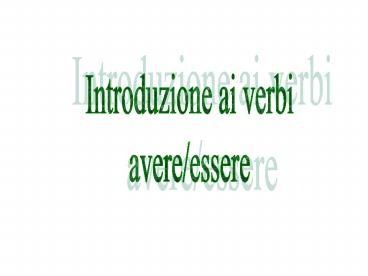Verbs are presented 2 ways:the infinitive and conjugated forms
1 / 17
Title:
Verbs are presented 2 ways:the infinitive and conjugated forms
Description:
... does make sense An English example would be 'raining cats and dogs' ... avere torto (to be wrong) avere bisogno di . . . (to have a need of) avere voglia di. ... –
Number of Views:48
Avg rating:3.0/5.0
Title: Verbs are presented 2 ways:the infinitive and conjugated forms
1
Introduzione ai verbi avere/essere
2
Verbs are presented 2 waysthe infinitive and
conjugated forms
3
infinitive to . . . In English
In Italian to eat mangiareto dance ballare
to read leggere
4
most of the time infinitives are not
used. more often we use the
conjugated form which varies according to
who you are talking about
5
conjugated forms are always presented in
the same order of formsIyou he/sheweyou
guysthey
6
singular 1st person io (I)
2nd person tu (you) 3rd person
lui/lei (he/she) plural 1st person
noi (we) 2nd person voi (you guys)
3rd person loro (they)
7
verbs can be either regular or irregular.
Regular verbs follow a set pattern and
irregular verbs follow no set pattern.
8
Conjugating regular verbs is
easy once you learn the pattern.
Conjugating irregular verbs is more
challenging when you study irregular verbs you
must learn all 6 forms.
9
The first 2 verbs we will study, 2 of the
most common in Italian, are irregular verbs
avere (to have) essere (to be)
10
Avere (to have) (infinitive) io ho
tu hai lui/lei ha noi abbiamo voi
avete loro hanno
11
avere is used in many idiomatic
expressions An idiomatic expression is one
that when translated literally doesnt make
sense, but when considered as an expression, does
make sense An English example would be raining
cats and dogs
12
avere paura di . . .(to be afraid
of)avere fame (to be hungry) avere sete (to be
thirsty)avere ragione (to be right)avere torto
(to be wrong)avere bisogno di . . . (to have a
need of)avere voglia di . . . (to have a desire
of)
13
avere paura di (to be afraid of) avere sonno
(to be sleepy) avere freddo (to feel cold)
avere caldo (to feel hot) avere fretta (to be
in a hurry) avere . . . anni (indicates age)
14
Come si dice? I am tired.He is hungry.
They are cold. She is 18. You are in a hurry.
15
I am tired. Io ho sonno.He
is hungry. Lui ha fame.They are cold.
Loro hanno
freddo.She is 18. Lei ha 18
anni. You are in
a hurry. Tu hai
fretta.
16
essere (to be) (infinitive) io sono
tu sei lui/lei e noi siamo voi
siete loro sono
17
Since the verb form indicates the subject,
the subject pronoun is optional. Io sono
contenta. Sono contenta. Sono contenta io.































